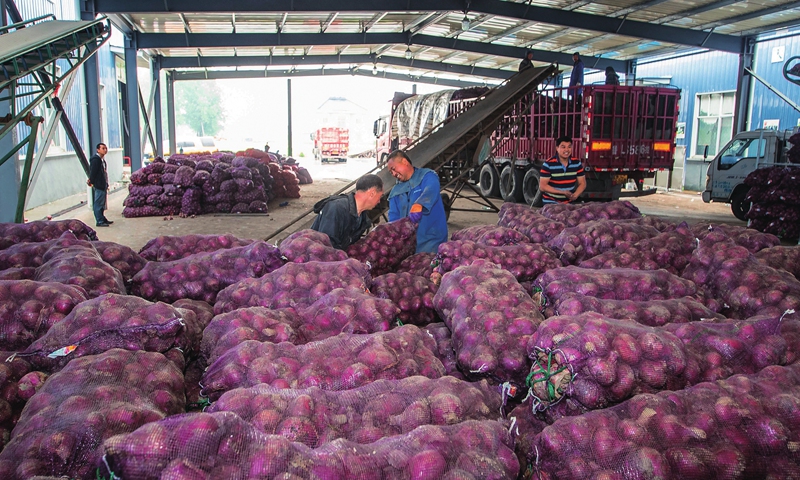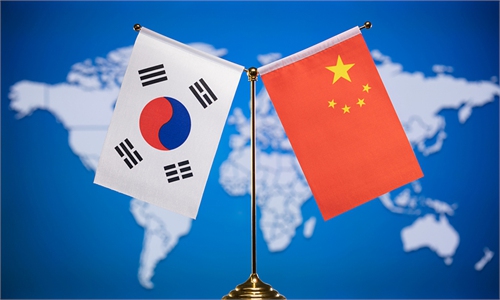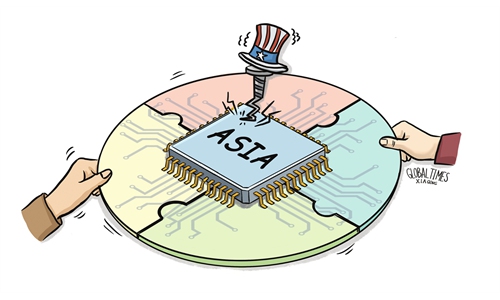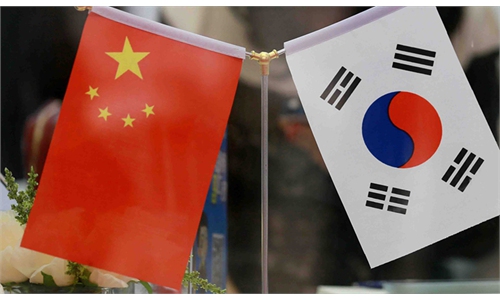
Farmers in Lianzhen village, Xinghua in East China's Jiangsu Province unload bags of red onions to be shipped to East China's Shandong Province in May, 2021. It's the peak time for the village's red onion harvest. Photo: cnsphoto
A South Korean industry association said there is a chance that Chinese onion exports will help the country alleviate its inflation, as the South Korean government moved to keep zero tariffs on seven major foodstuff import items in an effort to rein in price rises.
With increased imports from China to ease the burden on South Korean inflation, a Chinese expert said cooperation among countries in Northeast Asia should be further strengthened amid rising global uncertainties, including the lingering COVID-19 pandemic and fluctuating global commodities prices.
Under the impact of complicated factors, South Korea saw inflation reach its fastest pace since 1998 in June, with consumer price index advancing 6 percent from a year earlier.
To rein in the runaway prices, the South Korean government has announced some temporary measures to rein in prices in staple goods, and has decided to impose zero tariffs on seven daily necessities starting from July.
Subject to the zero tariffs will be 100,000 tons of beef, 82,500 tons of chicken, 10,000 tons of powdered milk, 30,000 tons of pork belly and 448 tons of green onion, as well as coffee beans and ethanol materials.
The Beijing office of the Korea International Trade Association (KITA) told the Global Times in a recent interview that while South Korea's beef and chicken mainly come from other suppliers, it expects the new policy will result in an increase in onion imports from China, which has been a major supplier to South Korea of fresh and frozen onions.
The KITA added that while it expects the new tariff policy will help stabilize staple food prices in South Korea, it is too early to assess its actual effect.
The price of green onions rose by 87 percent month on month in July, a South Korean source told the Global Times Sunday.
In Shandong, where many onion growing bases are located, farmers told the Global Times that they had yet to feel a palpable increase in order inquires or shipments, and that the pandemic has forced some exporters to halt shipping onions to South Korea.
A manager with an agricultural products exporting company told the Global Times that her company is currently in the middle of processing an onion order, but she has not seen a marked rise in inquiries from clients in South Korea.
Most onions are ripe for export in winter, but the pandemic has increased the difficulty of doing cross border trade and some exporters have left the market, the Global Times learned.
Li Tianguo, associate professor at the National Institute of International Strategy, told the Global Times Sunday that Northeast Asian countries joining hands are better positioned to safeguard industrial supply chain security and protect national economies from the brunt of internal and external shocks.
Li said the rising inflation in South Korea is caused by complicated factors including the international economic situation and a fall in domestic supply, while China's agricultural products have marked cost advantages and the zero-tariff policy is set to alleviate the supply/demand imbalance in South Korea.
Against the backdrop of a fragile global recovery, trade between China and South Korea has maintained rapid growth. From January to June this year, bilateral trade reached $184.25 billion, up 9.4 percent year-on-year, surpassing China-Japan trade, according to the Ministry of Commerce last week.
South Korea used to be China's fourth largest agricultural products export destination. But the country has kept high tariff rates in place to protect its domestic industry, curbing Chinese exports to South Korea.




